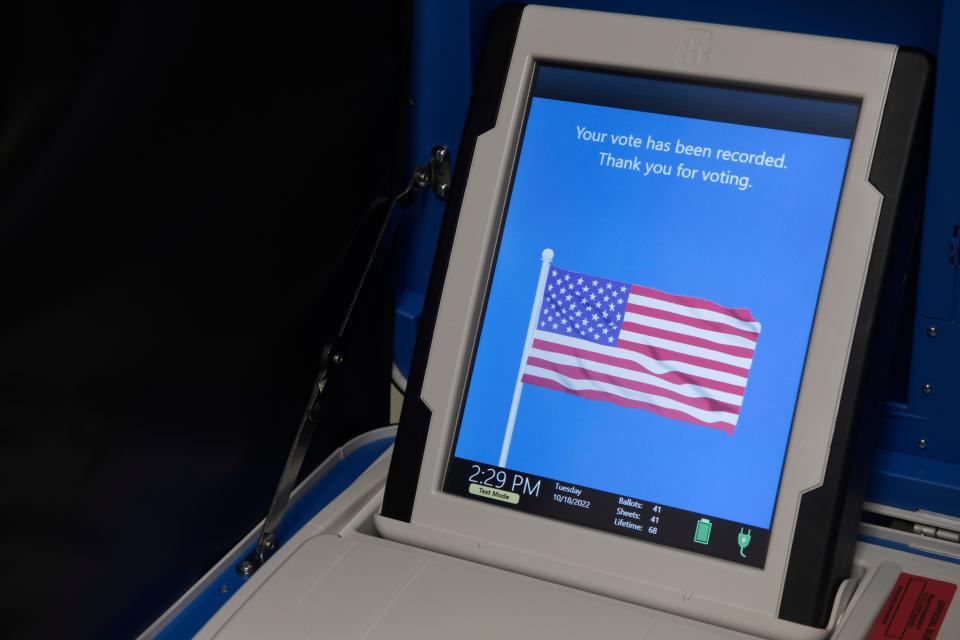Why does the AP call elections? Here's what you need to know about how, why it's done
On Election Day Tuesday, millions of ballots will be cast around the nation, then millions of Americans will monitor election results to see the votes being counted and winners declared.
Audiences will see a majority of national, state and local media outlets pushing alerts or headlines that may read along the lines of "AP calls (insert state) for (insert name here)." Interestingly enough, most outlets will wait for AP to call the election before they run their own stories.
But why is that?
Here is a quick explanation of why the AP calls races for most media outlets and how they do so.
What does AP stand for, and what is it?
AP is the abbreviation for the Associated Press.
According to its website, AP was founded in 1846 in the U.S. and its content reached 4 billion people daily with a team of journalists in 100 countries and all 50 states.
Why does the media wait for AP to call election results?

States and local governments oversee and run elections in the United States. However, every state runs elections differently, which is generally seen as a strength in protecting elections.
Officials must tabulate the votes according to their state laws and other procedural steps before the secretaries of state certify their results, which could take days or months.
In Texas, the Governor and Secretary of State have until Dec. 8 to certify and make the election results official.
Due to this gap between Election Day and certifying results at the state level and in Congress, the AP and other media outlets step in to declare the winners of races using their own methods.
Here is how AP does it.
How does AP call elections?
In a video posted on AP's Election website, David Scott, vice president and head of News Strategies and Operations for the AP, said the AP will not call a race unless it's absolutely certain.
"We don't declare a winner until we are 100% confident that the trailing candidate can't catch up," Scott said.
Other are reading: How secure are elections, voting from cyberattacks? Here is what you need to know
AP does this by looking at all 50 states' polling data and not just the few swing states, which Scott said is because it is unknown which state will push a candidate into the lead as all votes matter.
In an explainer story, the media outlet says it takes into consideration the following while watching the results being reported:
How many votes haven't been counted yet.
How many ballots had been cast.
What type of votes (mail or Election Day in-person ballots) still need to be counted.
Historical voting data and other factors.
Additionally, the AP also does not rely on exit polls — surveys conducted on Election Day as voters leave polling stations. Rather, the media organization developed its own surveying process called AP VoteCast that will factor in over 100,000 interviews from all 50 states to aid AP race callers.
AP VoteCast is conducted by NORC at the University of Chicago on behalf of AP, Fox News, PBS NewsHour and The Wall Street Journal. The survey methodology can be found on AP's website.
Has the AP not called a race before?
According to its website, yes.
The AP did not call the 2000 race between George W. Bush and Al Gore because the media outlet recognized the margin of error in Florida, which made the race too close to make a definitive call. For context, this was the race known for ballots with "hanging chads."
Others are reading: As US Senate race winds down, Cruz courts rural base as Allred looks to urban Texas
Has AP been wrong before?
With an accuracy rate of 99.9%, AP has gotten it wrong twice.
These two wrong calls happened with in state legislative races — one was due to an election official publishing the wrong data. The other was a mistake acknowledged by the AP.
AP has also been wrong in a presidential election, with the last time being in the 2008 primaries.
Who else calls U.S. elections?
Voters throughout the night might hear the term projections from media outlets. This simply refers to an individual media outlet's methodology for predicting who will win that race or state.
Just like the AP, individual news outlets can call a race, too, but those are independent of the AP.
When can we expect results from this year's election?
That is still unknown. Texas requires posting all unofficial results 24 hours after polls close, but as the AP said in its articles, it might take a few days before all ballots - including mail-in ballots - are counted.
This article originally appeared on Lubbock Avalanche-Journal: Understanding why, how AP calls results in 2024 presidential election